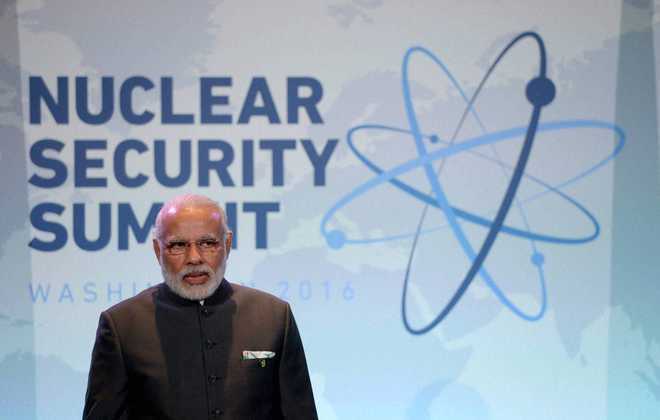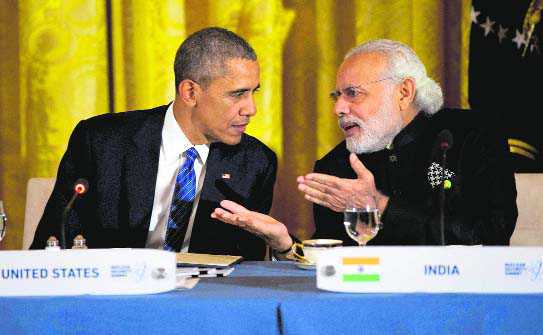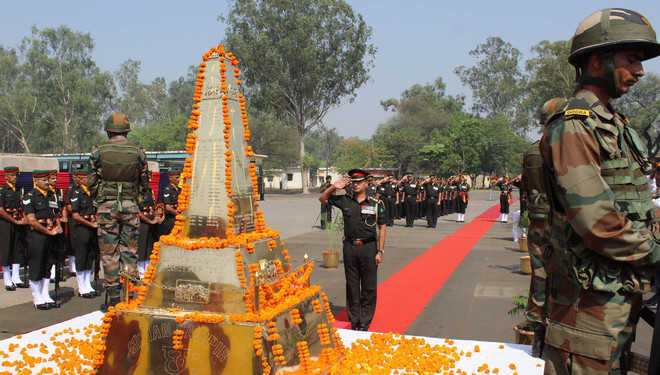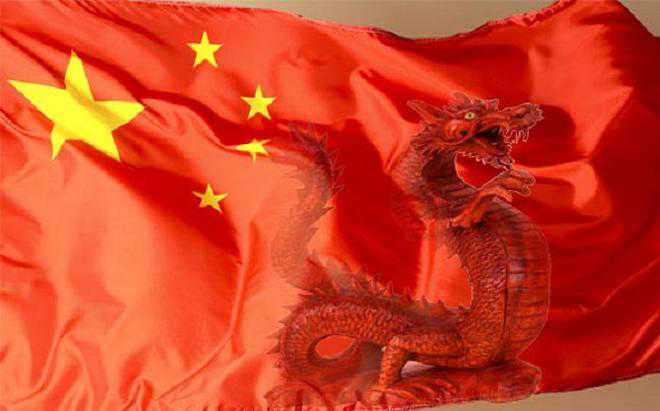Last week, even as Prime Minister Modi embarked on his Five Nation Tour, I suggested that consolidation of a few doables would be the criteria to judge the trip’s success. Mr Modi appears to have delivered in full.
On his fourth visit to the US and seventh meeting with President Barack Obama, all in two years his, transformative achievements have converted the Indo-US Strategic Partnership to what seems to be the take off stage.
Is it the full Monty this time, finally 25 years after the Kicklighter Proposals were put to the Narasimha Rao Government?
Even before attempting to justify the presumption of a full Monty it is tempting to take the US-India-Pakistan equation as first context.
It was hyphenation of the India-Pakistan linkage in all strategic affairs which held back the realization of the true potential of the US-India partnership.
The relationship was described by Prime Minister Vajpayee as one between ‘natural partners” on the basis of convergence of interests and democratic values.

Two things held this back and kept it pegged to only dialogue and just potential.
First was the inability of the US to transfer its focus from its Euro-centricity to the Asia Pacific where the next great game had already begun.
Much as it tried, the post-Cold War search for a new world order refused to move it away from the Middle East, from energy and from the emerging ideology of radicalism.
9/11 saw the further application of the pull towards Afghanistan and then Iraq.
In all these years of US efforts in Af-Pak and Iraq, China quietly developed its comprehensive power.
The second was the US dependence on Pakistan for the stabilization of Afghanistan; hence the hyphenation despite India’s clear breakout from the mold of sub-regionalism.
Afghanistan continues to be restless, Iraq and Syria are yet unstable, the ISIS is still a threat to reckon with; yet the US has decided that it has to move beyond and clearly the destiny lies in the Indo-Pacific, a term it has deliberately chosen to foist, for good reason. T
The Iran Nuclear Deal was driven by this strategy too and it took some convincing for the US to itself feel the necessity of bringing Iran out of isolation.
Back to the Modi US visit. Many feel that Barack Obama as a lame duck President would be unable to take transformative decisions.
One thing seems removed from consideration; the potential of the Democrats returning to the Presidency with a possible election of Hilary Clinton; something analysts, lawmakers and even the President would believe.
It would be the first instance of a third term for one of the two parties in the US, since the end of the Second World War.
That somewhat removes the clichéd label from the Obama Presidency enabling the President to take his decisions. Clearly, it was an advantage for India to reap benefits.
A natural corollary to Prime Minister Modi too, being looked upon as a transformative leader, and to the personal bond that has developed in six previous meetings.
Such visits and discussions must also be viewed in the context of the events that precede them.
The killing of Mulla Mansoor, Pakistan’s protests on violation of its sovereignty, the US Congress’ strictures on the F-16 deal, the India-Afghanistan-Iran Trilateral on Chahbahar and other cooperation, have all influenced the atmospherics of the Modi-Obama summit.
While speculation is still rife in the US about Prime Minister Modi’s visit to Iran and the Chahbahar deal (whether it fits in with the leeway given to Iran under the Iran Nuclear Deal of Jul 2015) there can be no doubt that India’s diplomatic establishment would have done its homework.
The Prime Minister’s visit no doubt would have been used to explain the dynamics and how Chabahar fits into the future of the stabilization of Afghanistan; one of US aims too.
Three things signify the full Monty. The first is the break out of the shackles of technology denial and discrimination exercised under the Missile Technology Control Regime (MTCR).
In its inception MTCR was formulated as an India specific technology denial regime to thwart India from attaining cryo-technology from erstwhile USSR.

Over the years India developed its own such engines. George Bush broke all protocols to sign the India US Nuclear Deal which commenced the process of treating India as an equal and a responsible player.
Obama has put his stamp on facilitating the entry of India into MTCR thus opening up the potential for provision of spin off technologies and trade in missile and advance aviation technology.
The entry into MTCR comes full circle from the events of 1971 when Richard Nixon sent the Seventh Fleet into Bay of Bengal.
It set the path for a patchy relationship which saw the formation of the NSG and the MTCR, to deny India its technological ambitions after the Pokharan test of 1974.
Entry into the 48 member NSG now appears to have the support of almost all members and is fully backed by the US thus isolating China which opposes it.
There is speculation that India’s entry may as yet not materialize. Will the US go the full distance to accept and support China’s entry into MTCR for which it applied some years ago as a quid pro quo for China’s acceptance of India’s entry into NSG? That remains the moot point.
The second is LEMOA or Logistics Exchange Memorandum of Agreement.
This is another agreement the text of which has been agreed upon and will be inked in due course. The transformational element of this perhaps surpasses MTCR.
It will open Indian maritime and aviation facilities for refueling and other logistics support to the US Armed Forces.
The ambit would functionally include the Indian Navy’s use of US ports such as Djibouti, Diego Garcia, Guam and Subic Bay as part of port calls, training and disaster management.
The implications go well beyond the functional aspects with India’s almost complete turnaround from a policy of isolationism in this field. If that is not transformational nothing else is.
There are other specifics which shore up the value of the visit. India’s support for the Paris Climate Agreement, clean energy, climate change and energy security through use of nuclear energy, are all valuable contributors towards the strategic partnership.
The third area which signifies the transformational nature of changes underway needs a little more explanation. This relates to the South China Sea (SCS) about which Joint Statements of the past have been bolder with direct reference.
This time the Joint Statement is conspicuous in the absence of mention of SCS although there is mention of the guidelines and road map on maritime security.
Much against what many may assess as compromise on strategic boldness I perceive this as strategic prudence. The US has displayed maturity in not insisting on the inclusion of SCS thus acknowledging India’s strategic sensitivities in its region.
It is in US interest to maintain the strategic balance in Asia and respect the interests of its strategic partners. This it has amply displayed by ensuring that in its projection it is willing to be reasonable and that its partnerships are not alliances aimed at third nations.
It is not necessary for partner nations which have their mutual interests well chalked out, to place in the public domain specific aims of the partnerships which will have ramifications on third parties or third party concerns.
Finally, the US appears to realize that it cannot expect a full cooling down of the Middle East, dilution of problems of Europe in relation to Ukraine or stabilization of Afghanistan before the efforts towards rebalancing can commence in earnest.
The Modi visit may well be the virtual culmination point of the decision making process which finally cements the US resolve to change tack and earnestly focus on the Indo Pacific as the priority of its concerns.
The Indian Prime Minister must be credited for having pulled out all the stops in finally converting a hesitating, nervous and tentative relationship into a truly strategic partnership – the full Monty so to say.

writer
Lt Gen Syed Ata Hasnain(Retd)


















 Colonel Jasjit Singh has been given bail on an amount of Rs 10 Lakhs and the court has directed that he shall not leave Aizawl during bail. (Express Photo)
Colonel Jasjit Singh has been given bail on an amount of Rs 10 Lakhs and the court has directed that he shall not leave Aizawl during bail. (Express Photo)
























































